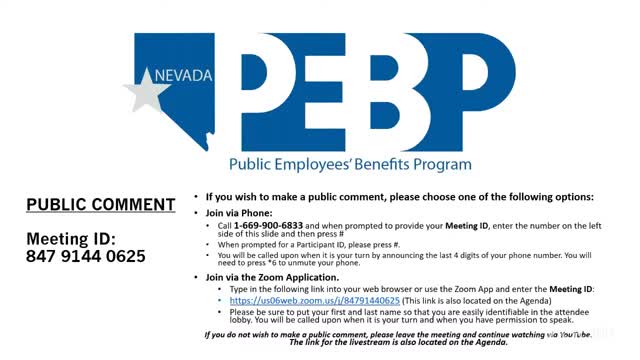PEBP board reviews 2025 bills; public commenters urge opposition to AB22 and SB32, support for AB188
Get AI-powered insights, summaries, and transcripts
Subscribe
Summary
The Public Employees Benefits Program (PEBP) board discussed a list of 2025 legislative proposals that staff say could affect plan operations and costs, with public commenters urging the board to oppose two PEBP-sponsored bills and back a bill to restore retiree health subsidies.
The Public Employees Benefits Program (PEBP) board discussed a list of 2025 legislative proposals that staff say could affect plan operations and costs, with public commenters urging the board to oppose two PEBP-sponsored bills and back a bill to restore retiree health subsidies.
Public commenters told the board they oppose Assembly Bill 22 and Senate Bill 32 as introduced and asked the PEBP board to take a formal position opposing them while urging support for Assembly Bill 188, which would restore a retiree health subsidy for employees hired after 2011. Kent Irvin, representing the Nevada Faculty Alliance, said the bills “chip away at the independence and authority of the PEP board to act as guardians and fiduciaries of the employee benefits plan.” Doug Unger, UNLV chapter president of the Nevada Faculty Alliance, told the board he and faculty are “incredibly nervous” about proposed moves to place PEBP under a Nevada Health Authority and urged the board to seek clarity from staff on the transition.
Why it matters: PEBP covers state employees and retirees and changes to procurement or reporting structures could affect how benefits are purchased and administered and how grievances and quality issues are handled. Several speakers and some board members said the proposals raise questions about PEBP’s independence, contracting authority and future costs.
Staff briefing and fiscal estimates
Celestina Glover, executive officer for PEBP, presented a bill-tracking table and described two agency bills: AB22, intended to streamline procurement and align PEBP with other state agencies’ contracting timelines, and SB32, proposed to move the quality-control (QC) officer position under the PEBP executive officer. Glover said AB22 is not intended to remove board oversight: “we would continue to bring the request for the RFP to the board in the first place” and the bill would change statutory language to require at least one board member on evaluation committees.
On SB32, Glover told the board that the QC officer’s role has shifted from an auditing function toward education, communication and an ombuds-like role; the bill would reflect that change by relocating the QC position under the executive officer. Glover said PEBP already undergoes multiple audits (annual financial audits, vendor audits and biannual compliance reviews) and that the change reflects the current duties of the QC position rather than restoring an auditor-style separation.
Fiscal notes and retiree-benefit estimates
Glover told the board that using current fiscal notes for the first 40 tracked bills yields illustrative costs of about $25.8 million in the first year, $30.1 million in the second year and $65.4 million in future biennia if every bill were enacted as currently drafted. She also discussed AB188, which would restore retiree health benefits for employees hired after 2011: PEB staff cited an OPEB (other postemployment benefits) liability estimate that rises from about $1.46 billion to $1.64 billion in the agency’s fiscal note if AB188 were to pass. Glover said PEBP estimates as many as 73 employees could become eligible as early as 2027 under a 15-year threshold, and that the agency projected a need for four additional staff in future biennia to manage added retiree workload; she also noted a 10–12 year window in which retiree counts could grow to about 1,000 in some scenarios depending on past local government service and other factors.
Board questions and concerns
Board members requested more detail on marked fiscal notes. Laura Rich asked about AB169’s fiscal note and said the $3.3 million figure “seems really, really high.” Glover explained the number is a conservative worst‑case calculation based on removing a 90-visit annual limit and assuming a high-utilization scenario (staff cited an approximate per-visit cost of $79.95 and a hypothetical up-to-250-visits-per-year scenario). Michelle Kelly urged staff to create a historical tracking table that matches legislation passed in prior sessions to the eventual cost realized by PEBP; Glover said PEBP tracks legislation but has not yet compiled a multi-session cost-history and agreed to prepare that analysis.
Several board members emphasized fiduciary concerns about contracting. Michelle Kelly and others said contracting is a core fiduciary duty under Nevada Revised Statutes and suggested the board should see request-for-proposals (RFPs) or scope-of-work language even if some procurement steps are streamlined by statute.
Positions and next steps
Several public commenters and board members urged formal opposition to AB22 and SB32 and support for AB188; staff and at least one staff speaker reminded the board that state policy typically requires agencies to testify neutrally and that individual staff cannot be directed to oppose legislation. No formal motion or vote was taken on any bill at the meeting. Glover said PEBP will continue to update the board on tracked bills and agreed to provide follow-up analyses requested by members, including a cost history of prior legislative changes and more information underlying fiscal-note assumptions.
Ending note
The board offered additional requests for detail and clarity; staff said they will return with more granular analyses if members want them. Because the board’s policy and the governor’s office typically keep agency testimony neutral, any request to take a legislative position would raise disclosure and staff-testimony considerations and would be considered separately.
